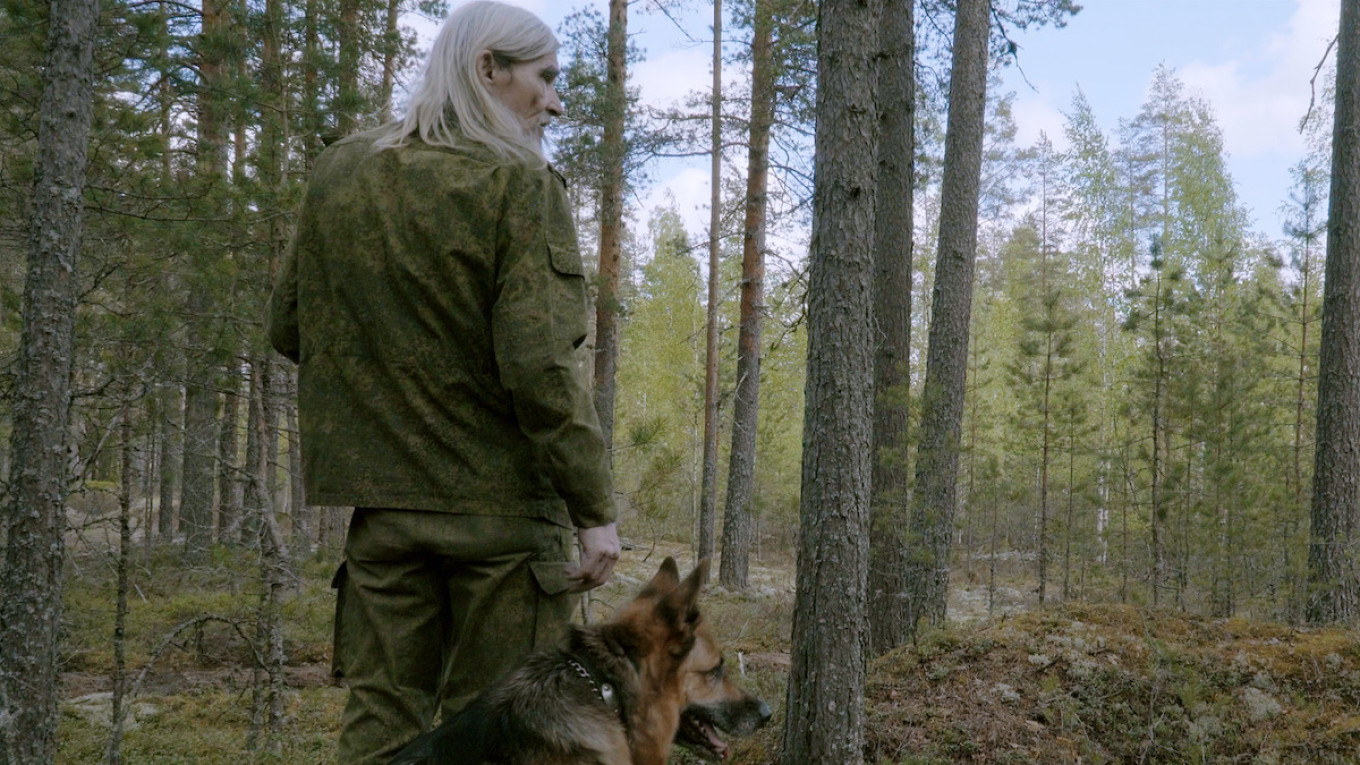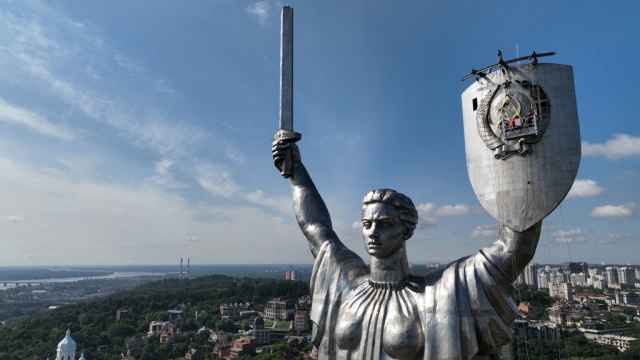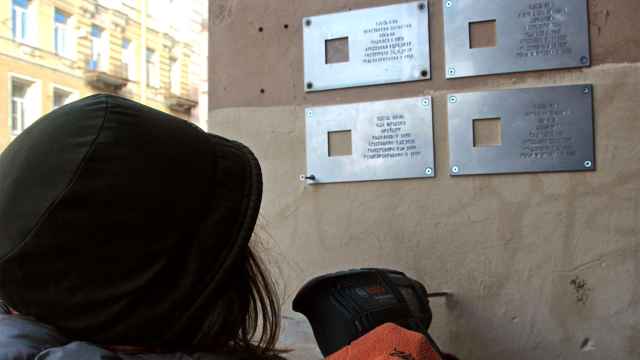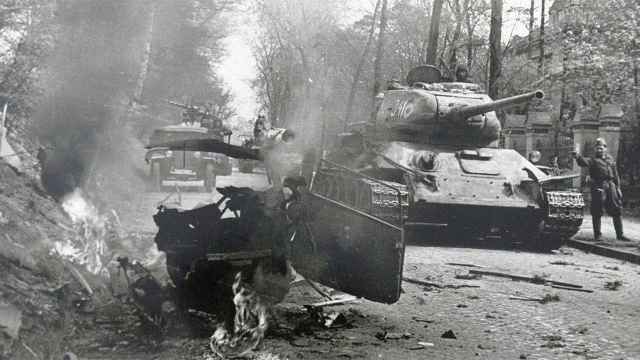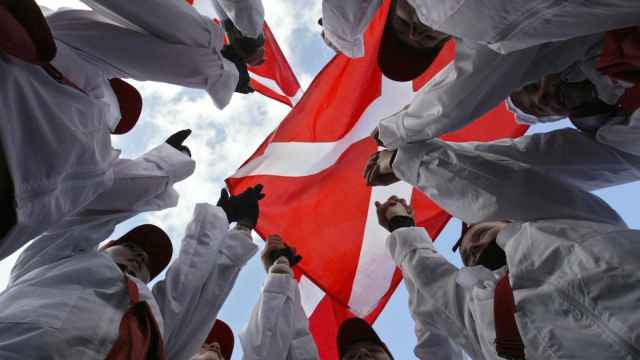AMSTERDAM — In the opening shots of “The Dmitriev Affair,” the viewer walks alongside Yury Dmitriev, the gulag historian who uncovered and documented Stalin-era mass graves in his home region, the northern republic of Karelia.
Dressed in camouflage, with long, white hair and goatee framing his angular face, Dmitriyev silently treads through the mossy taiga forest like a specter, searching for traces of more graves with his young adopted daughter, Natasha.
Minutes later, the viewer is thrust into the cold, clinical Russian criminal justice system alongside Dmitriev himself.
Escorted up a winding staircase by law enforcement officers, this Dmitriev is physically diminished: hair close-shaven, wrists bound by handcuffs, body hunched over.
“The Dmitriev Affair,” award-winning Dutch documentary filmmaker Jessica Gorter’s latest film that premiered last week to a full house in Amsterdam, chronicles the events leading up to Dmitriev’s imprisonment — and illustrates how Russia’s system of repression can tear lives and families apart.
Dmitriev, 67, played a key role in uncovering a set of Stalin-era mass graves in the forests of Finland-bordering Karelia in the glasnost period of the late 1980s.
As regional head of the human rights organization Memorial, Dmitriev spent the next decade digging through the KGB archives to identify thousands of victims of Stalin’s Great Terror in the mass graves at Sandarmokh and Krasny Bor.
“Officially, these people ‘didn’t exist’,” Gorter told The Moscow Times. “He gave them back their names, and established that they were killed.”
Gorter met Dmitriev while working on her 2017 documentary “The Red Soul,” which explores the reckonings that ordinary Russians have had with the brutal past of the Soviet Union.
“What I saw most in him was the recognition that something happened and his readiness to speak out,” Gorter said. “When I started on this film, I had no idea where it would take me. One thing I knew for certain — Yury’s story must be told.”
The 96-minute documentary shows Dmitriev’s journey through interviews shot at his home and over Skype as well as voiceovers of his letters from prison. Little music is used apart from ominous drums and horns at various intervals.
Interspersed with archival footage from the Stalin era and the 1990s, the film also depicts the sorrow and catharsis felt by the victims’ families as they learned where their missing relatives had gone.
“Humans should be allowed to know their heritage and where their family members are buried,” Dmitriev says in the film.
“Our state aims to wipe out the individual as if he never existed,” he says at a later point. “The people aim to remember every single one.”
It was only a matter of time before Dmitriev’s work struck a nerve.
“For the past 10 years, you could speak about the victims, no problem,” Gorter said. “As soon as you connect [Soviet repressions] to contemporary Russia, then there’s a problem.”
Just months after Gorter traveled to Karelia to film him in 2016, Dmitriev was accused of child pornography after investigators found nude photos of 11-year-old Natasha. Dmitriev — and, later, court-appointed investigators — said the photos were taken to monitor the health of a sickly child.
While he was acquitted of those charges in 2018, he was soon charged with sexually abusing his daughter. In 2020 he was sentenced to 13 years in prison, a term later extended to 15 years.
On the day of his acquittal in 2018, all contact between Dmitriev and Natasha — who had been sent to live with her biological grandmother after his 2016 arrest — was cut off.
“They seemed to have a genuine and gentle relationship,” Gorter said of Dmitriev’s bond with his adopted daughter. “Yury was very concerned with her upbringing and well-being.”
“The Dmitriev Affair” deftly conveys the context in which Dmitriev’s trials took place — from Russia’s glorification of the Soviet past to its narrative that rights activists are working on the orders of the West to discredit and destabilize Russia from inside.
It is this same rewriting of the past which allowed the Kremlin to justify its invasion of Ukraine last year.
At one point in the film, Dmitriev tells Gorter that Russia, emboldened by its widening domestic clampdown and relatively light-handed punishment for annexing Crimea, would continue down this path until it inevitably started a “worldwide carnival.”
“Every year on August 5, the day of remembrance for Sandarmokh victims, Yury would make a speech, and after the annexation of Crimea in 2014 he openly spoke out against Russia’s aggression in Ukraine,” Gorter said.
In a bitter twist of fate, Dmitriev is today serving his sentence at a penal colony in the republic of Mordovia which had been founded as a gulag camp in the 1930s.
Gorter is no longer in direct contact with Dmitriev but receives updates on his condition through his friends and family.
“He is put in solitary confinement if his shirt is unbuttoned by one button. Or if, because of his high blood pressure, he gets dizzy and sits down for a while,” Gorter said.
She said he is allowed to receive two 20-kilogram packages of food and other essentials per year.
Just as one of those packages arrived, Dmitriev received a new pair of glasses from his lawyer to replace his broken pair — a prized possession, as he needs them to read books and review court documents.
But when the new glasses arrived, the prison colony administrators told him he must choose between the glasses and the parcel with food.
“He chose the glasses,” Gorter said.
It is hard to watch “The Dmitriev Affair” without thinking of other Russian rights activists and opposition figures currently in prison or on trial, as well as that of U.S. journalist Evan Gershkovich, who was arrested in Russia in March on widely debunked espionage charges that could see him sentenced to up to 20 years.
On the day “The Dmitriev Affair” premiered in Amsterdam, Memorial co-chair Oleg Orlov went on trial in Moscow for his criticism of the war in Ukraine. If found guilty, he faces up to five years in prison.
“I hope [the film] will bring attention to all those who are fighting for justice from the inside,” Gorter said.
“We must not forget these people. We must continue to support them."
“The Dmitriev Affair” is now showing in film theaters all over The Netherlands. The film is in Russian with Dutch subtitles.
A special screening with English subtitles followed by an English Q&A will be held at Ketelhuis in Amsterdam on Monday, June 19.
A Message from The Moscow Times:
Dear readers,
We are facing unprecedented challenges. Russia's Prosecutor General's Office has designated The Moscow Times as an "undesirable" organization, criminalizing our work and putting our staff at risk of prosecution. This follows our earlier unjust labeling as a "foreign agent."
These actions are direct attempts to silence independent journalism in Russia. The authorities claim our work "discredits the decisions of the Russian leadership." We see things differently: we strive to provide accurate, unbiased reporting on Russia.
We, the journalists of The Moscow Times, refuse to be silenced. But to continue our work, we need your help.
Your support, no matter how small, makes a world of difference. If you can, please support us monthly starting from just $2. It's quick to set up, and every contribution makes a significant impact.
By supporting The Moscow Times, you're defending open, independent journalism in the face of repression. Thank you for standing with us.
Remind me later.



